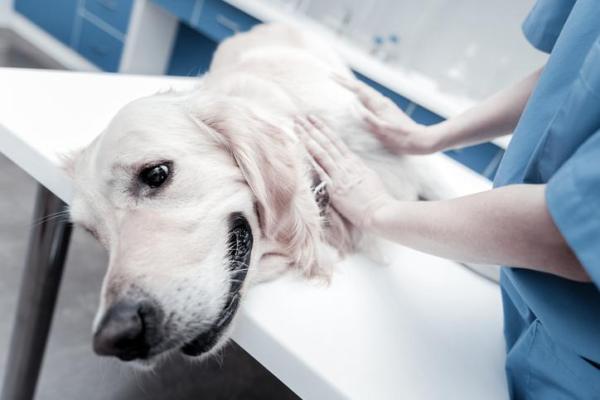Dog Indigestion Symptoms and Treatment



See files for Dogs
Also known as dyspepsia in dogs, indigestion is a relatively common gastrointestinal issue in canines, but its acuity varies greatly. It can range from a slightly upset stomach to practically incapacitating the animal. Unfortunately, our dogs cannot directly communicate their gastrointestinal status to us. For this reason, we need to look at the various clinical signs and symptoms which can related indigestion. Especially with dogs that eat too fast, we might think it is normal for our pet to be bloated regularly. However, this can be harmful for our dog and needs to be avoided. It can result in serious problems such as gastric torsion which can be fatal.
For this reason, AnimalWised explores dog indigestion symptoms and treatment. We also look at possible causes of dyspepsia in dogs so we can best avoid it in the future.
Causes and risk factors for indigestion in dogs
Some of the most common causes of dog dyspesia are eating excessive amounts of food or eating food too quickly. These can occur with particularly voracious dogs that eat their commercial feed too quickly. It also often occurs with guardians who overfeed their dogs, especially by regularly giving them rich treats or human food. Any dog will suffer from indigestion in the right circumstances, but some dogs are more prone to it than others.
One group of dogs particularly prone to ingestion are those which have food insecurity. For example, dogs which have been abandoned will only be able to eat when they find food. They will eat quickly for survival reasons. If these dogs are then adopted, they may maintain their previous insecurity over food and eat quickly even when it is given to them regularly.
Dogs that are not provided a suitable diet or have a haphazard feeding schedule might also experience food insecurity. These are animals of habit and need regular daily meals to ensure they don't worry about where their next meal is coming from.
Another group of dogs known to suffer from indigestion more than others are brachycephalic dog breeds. These dogs have a body conformation that makes digestion difficult. Issues such as a shortened esophagus and an extended soft palate can make ingestion and digestion problematic.
Dogs that live in a negative environment that causes stress, fear or anxiety are also more vulnerable to suffering from food issues. They can even develop more severe digestive diseases. This is because eating food can make them feel better, so they over eat or become anxious when eating.
Other dogs may have issues such as food intolerances which can range in severity. These can cause dyspesia due to what they eat, rather than how they eat. Each dog is an individual and will need a diet adapted to their specific needs. If the food they eat does not meet these needs, it is much more likely that dog indigestion or similar gastrointestinal upset.

Most frequent symptoms of indigestion in dogs
Many guardians wonder how to know when their dog has dyspepsia. Even if they are careful with the dog's diet, they may notice certain signs which seem to indicate they may have issues with indigestion. Generally, the first issues we might see are belching, retching or even vomiting after the dog eats their food.
Vomiting is not the only symptom of dog indigestion. Depending on the severity, we may also see one or more of the following:
- Dizziness
- Nausea
- Diarrhea
- Inactivity
- Weakness
- Abdominal discomfort
- Stomachache
- Lying in strange positions
- Concern
- Nervousness
How to treat dog indigestion
If your dog shows the above symptoms of indigestion in dogs a short while after having ingested their food, dyspepsia may be the likely cause. A mild case of indigestion is not serious and will often resolve on their own. It is common for dogs to experience dyspepsia at some point during their lives.
In these cases, the best thing we can do is suspend the feeding of our dog for between 12 and 24 hours, depending on the severity and evolution of their symptoms. They should have access to water at this time. Especially if the dog has diarrhea or vomiting, a lack of water can lead to dehydration and worsen the clinical picture
After this short period of fasting, we will need to progressively restore their diet. We do so by offering their food in smaller portions split into several feedings. If we give them all their food in one meal, they can eat quickly again and return the symptoms of indigestion in dogs.
When these dog dyspepsia signs and symptoms are repeated regularly or are of a great severity, we need to take the animal to a veterinarian. It is possible the dog has one of the issues mentioned above which requires veterinary diagnosis and potential medical intervention. If pathological causes of indigestion have been ruled out, we will need to consider stress and behavioral origins of the symptoms. In this case, you should ideally speak to a canine ethologist or dog trainer to assess the animal.
If you suspect that your dog may have ingested some dangerous food or toxic substance, do not hesitate to go to the veterinary center or hospital closest to your home. The dog could go into toxic shock in such cases. Generally speaking, if acute symptoms of indigestion in dogs last longer than 24-36 hours, you should speak to a veterinarian for assessment.

Home remedies for indigestion in dogs
In the case of possible indigestion due to excessive consumption of feed or homemade food, we can use some homemade solutions to reduce the stomach discomfort of our furry dogs, stimulate their digestive process and keep them well hydrated.
These natural remedies do not replace the specialized care of a veterinarian. They may help ease mild indigestion, but they are not a replacement treatment for a pathology. We should also know that there is relatively little research into many supposed home remedies. This means using them preventively might not only be ineffective, but it could cause other problems in certain dogs. They may even increase the likelihood of dyspepsia.
Some home remedies for indigestion in dogs include the following:
- Chamomile: provided in an infusion, it may help to settle their stomach. It should not be provided hot since this can burn the mouth of the dog. They may not want to drink it directly, so you can introduce it with a syringe little by little to the side of their mouth.
- Homemade solution: since indigestion can lead to vomiting and diarrhea, there is a risk of dehydration. We can provide a homemade solution for dehydrated dogs to help restore their fluids and bolster their recovery from dyspepsia.
- Bone broth: as long as it is not made with any ingredients which are toxic for dogs, bone broth can help a dog recover from digestion. It not only provides hydration, but it also has some of the nutrients the dog needs to bolster their system. It can be especially helpful for dogs that have lost their appetite.
Be careful providing home remedies for your dog, especially if you do not see the symptoms relieving themselves. Even if the dog has recovered, you should speak to your veterinarian about providing any supplements or dietary changes. In these cases, the individual dog's needs can be assessed and they will be best placed to make any specific recommendations.

How to prevent indigestion in dogs
The above treatments can help a dog recover from a bout of mild indigestion. However, there are certain care and lifestyle factors you should consider when approaching the feeding of a dog:
- Diet: provide them with complete and balanced nutrition, meeting the specific nutritional requirements of each stage of their life. If you feed them commercial feed, you can buy age-appropriate options for your dog. Amounts are important, too. For example, you should feed a puppy different amounts than an adult dog.
- Promote good eating habits: for example, dividing the total amount of food into 2 or 3 daily meals, establishing a rigid routine for when they are fed and using the kong for dogs to combat anxiety when eating. We should teach them to enjoy their meals and not simply gobble them up in one fast motion.
- Exercise: walking and other exercise should be provided at the most appropriate times, avoiding physical activity around feeding times.
- Take care of the home: maintain excellent organization in the home, so the dog does not have access to prohibited food, plants or toxic substances.
- Support: offer a positive environment and respect your dog's feeding times without disturbing him or causing anxiety.
As we have already stated, it is important to take into consideration your dog's specific needs. Take a look at our article on what to feed a pregnant dog to learn about one such specific instance.

This article is purely informative. AnimalWised does not have the authority to prescribe any veterinary treatment or create a diagnosis. We invite you to take your pet to the veterinarian if they are suffering from any condition or pain.
If you want to read similar articles to Dog Indigestion Symptoms and Treatment, we recommend you visit our Intestinal problems category.








